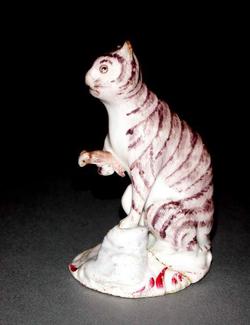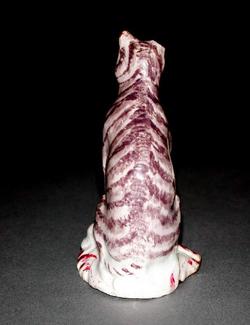Current Location: In storage
Titles
Cat seated with Mouse in its Paw
Maker(s)
Factory:
Bow Porcelain Manufactory
Entities
Categories
Description
Soft-paste porcelain figure of a cat, painted in enamels.
Soft-paste porcelain containing bone ash, press-moulded, and painted over lead-glaze in pale blue, dark puce, two shades of purplish-grey, and brown enamels. The underside is concave and glazed. The pear-shaped base has a scrolled edge and a small, stepped mound at the front. The cat sits at the narrow end of the base, looking straight ahead, and holding a mouse to itself with its right front leg. Its left paw rests on the mound, into which another mouse is disappearing, its back and tail still visible. The cat is painted to resemble a tabby in shades of purplish-grey. On one side there is a fingerprint. The mice are brown, and the mound is pale blue. The scrolls are picked out in dark puce.
Notes
History note: Christie's, 15 June, 1922, part of lot 32, two cats; purchased for £77 on behalf of Dr J.W.L. Glaisher, FRS, Trinity College, Cambridge
Legal notes
Dr J.W.L. Glaisher Bequest
Measurements and weight
Depth: 5 cm
Height: 8.1 cm
Acquisition and important dates
Method of acquisition: Bequeathed
(1928-12-07)
by
Glaisher, J. W. L., Dr
Dating
18th Century, Mid
George II
Circa
1753
CE
-
1758
CE
Note
Cats played a very important role in eighteenth-century households by catching mice which would otherwise have invaded kitchens and larders.
Label text from the exhibition ‘Feast and Fast: The Art of Food in Europe, 1500–1800’, on display at The Fitzwilliam Museum from 26 November 2019 until 31 August 2020: In early modern Europe, cats were kept primarily as ‘food guardians’ to prevent vermin from eating provisions. Some earned their keep as mousers, such as this tiny feline whose mouse-catching abilities have been immortalised in soft-paste porcelain: with one paw firmly placed on a mouse-hole (into which a lucky mouse escapes), she traps a less fortunate one in the other. Other cats, like the contented one in Valentino’s kitchen scene (displayed nearby), appear to have preferred living off kitchen scraps fed to them by indulgent servants.
School or Style
Rococo
Components of the work
Decoration
composed of
enamels
( pale blue, dark puce, two shades of purplish-grey, and brown)
Materials used in production
presumed lead
Lead-glaze
presumed phosphatic
Soft-paste porcelain
Techniques used in production
Press-moulding
: Soft-paste porcelain containing bone ash, press-moulded, and painted over lead-glaze in pale blue, dark puce, two shades of purplish-grey, and brown enamels
Lead-glazing
References and bibliographic entries
Related exhibitions
Identification numbers
Accession number: C.3055-1928
Primary reference Number: 41632
Old object number: 3799B
Stable URI
Audit data
Created: Saturday 6 August 2011
Updated: Friday 1 August 2025
Last processed: Friday 1 August 2025
Associated departments & institutions
Owner or interested party:
The Fitzwilliam Museum
Associated department:
Applied Arts






